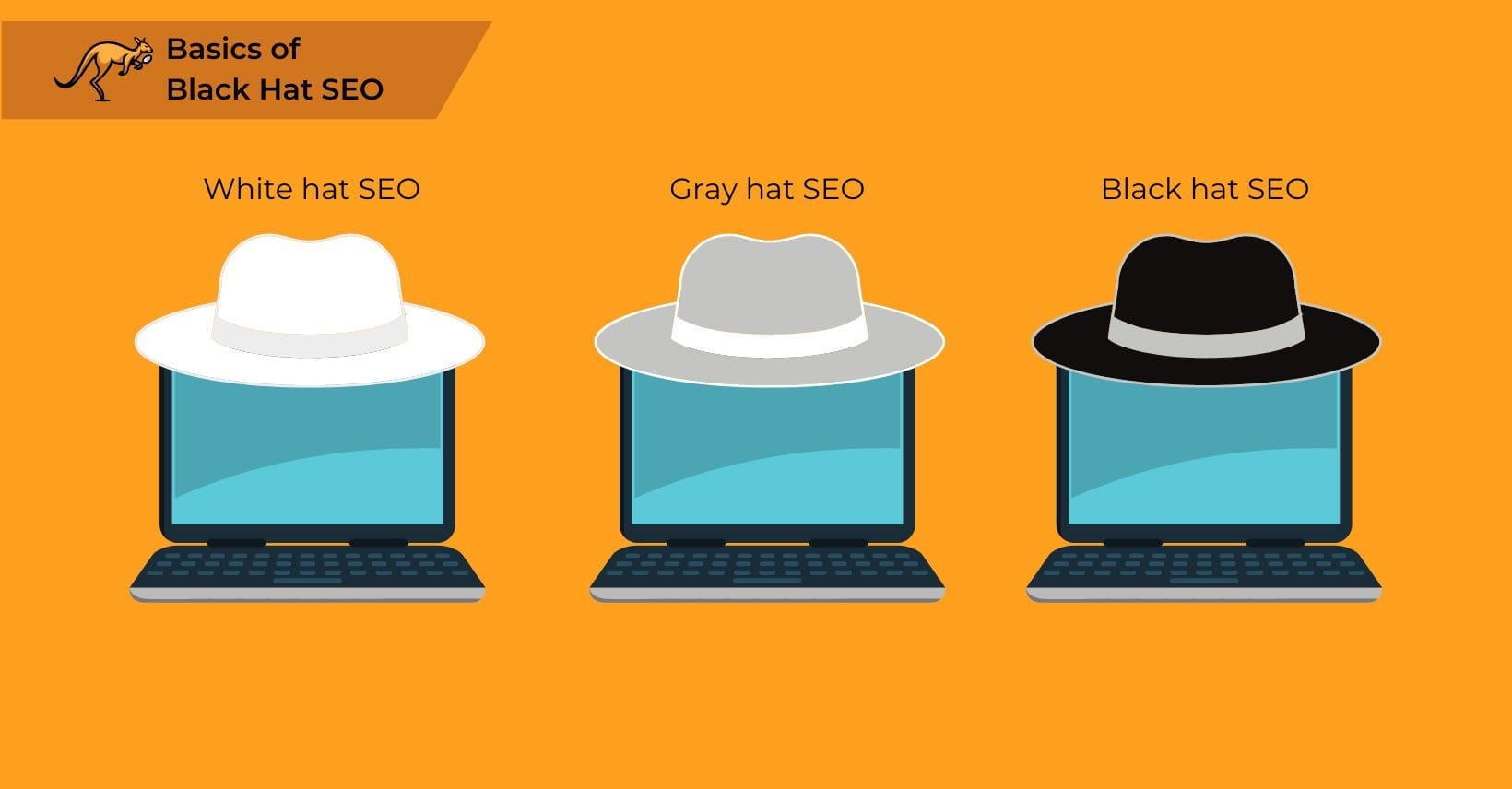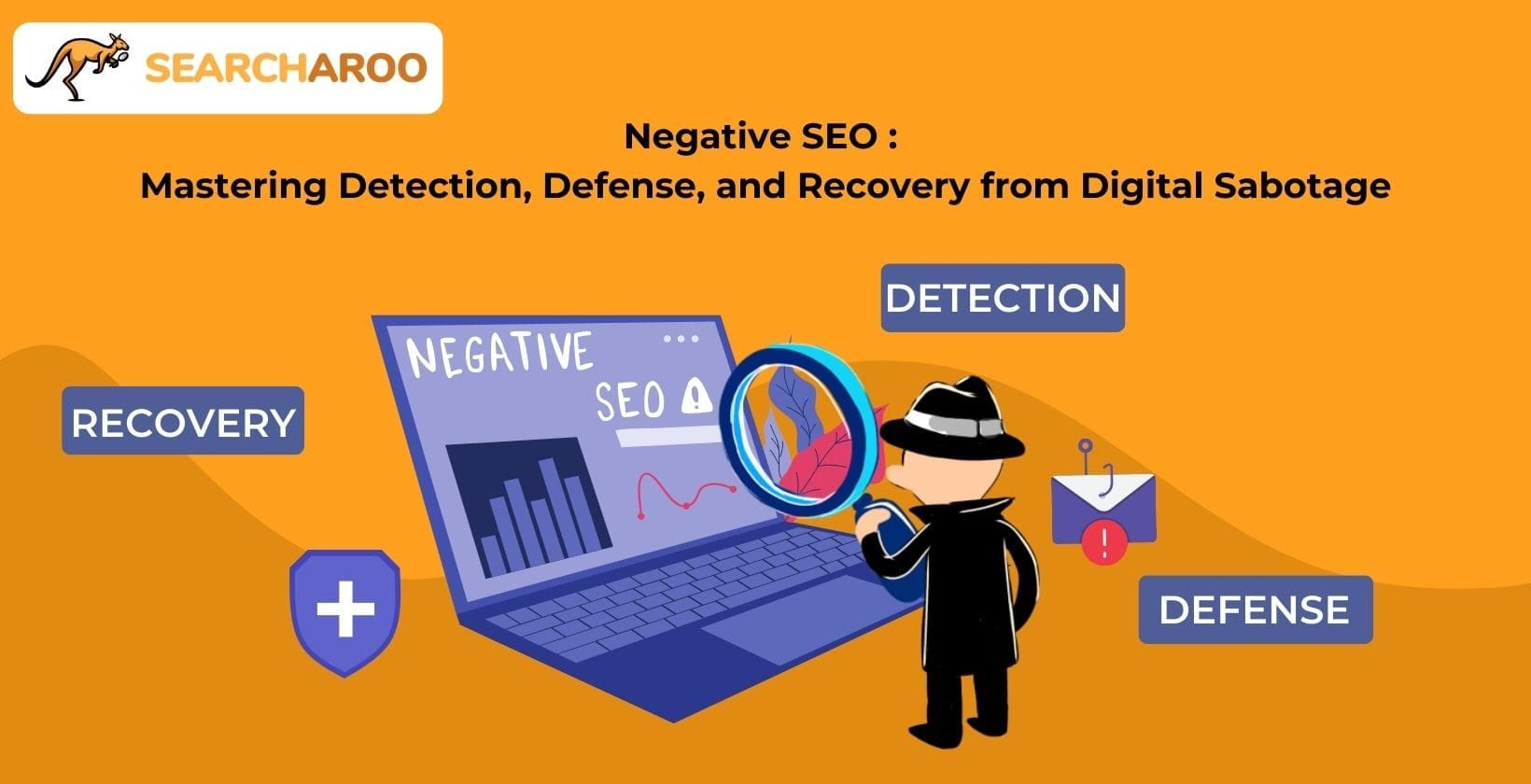You may have heard of Black Hat SEO techniques before, but not many people fully understand what Black Hat SEO actually is.
Whether you are looking for services that can boost your search rankings or just want to know more about every new SEO tactic you can, black hat is an important concept to understand.
But what are black hat practices, and how do they influence SEO? More importantly, are they something that you can freely employ on your own web pages, or are they something that might be best left alone?
The Basics of Black Hat SEO

In Search Engine Optimization, there are three main categories of techniques. These are based on how ethical they are and focus on different kinds of strategies based on what the client needs (or the SEO company deems necessary).
- White hat SEO, which focuses on using tactics authorized within Google’s guidelines. The focus is on the user themselves, and the SEO specialists do not use any tricky techniques or spammy links to try and secure higher rankings through illegitimate means.
- Grey hat SEO, which uses a mixture of techniques that both follow and violate (or skirt around) these guidelines. This might mean a balance of SEO techniques that Google fully endorses and others that are not officially approved by the search platform, such as combining web spam links with genuinely well-planned link schemes.
- Black hat SEO, which is all about unethical or unapproved practices. This can mean sneaky redirects, linking via spam comments, or even using entire private link networks to get a massive amount of authentic-looking paid links at once. Naturally, most search engines are not happy with these techniques.
The term “Black Hat” in SEO derives from old Western movies where villains wore black hats, symbolizing the use of unethical tactics that violate search engine guidelines for quick ranking gains.
In simple terms, black hat SEO is unethical SEO that goes against the set guidelines of most search engines, which involves manipulative tactics designed to trick search algorithms rather than provide value to users.
Since it focuses on techniques that are not permitted by Google or most other search engines, those platforms are naturally not very pleased to see sites using a lot of blackhat techniques and will usually take action against sites that rely on them.
While it can be tempting to use blackhat techniques as a way of gathering up higher rankings with very little effort, often producing visible results within days or weeks compared to months for white hat methods, black hat SEO remains an incredibly risky option.
The more you know about them, the easier it gets to avoid them and ensure that you are not being led into a black hat strategy that could backfire horribly on your website.
Remember: while different search platforms might have their own specific guidelines, most of these are shared across all major search engines. Using Google’s webmaster guidelines as a basis for your SEO will generally mean that you are avoiding black hat options on all notable search engines.
How Does Black Hat SEO Impact Your Site?
Unlike regular SEO, which focuses on getting links from high-authority websites and conducting proper keyword research, black hat methods are more focused on deception and fakery.
Most of these options are geared towards tricking users, search engines, or both. This can lead to short-term benefits, sometimes meaning benefits that are stronger than white hat options but can also result in major penalties to your site that might take a long time to recover from.
Black Hat SEO techniques occasionally still work in today’s search environment, though with significantly diminished effectiveness as search engines have evolved sophisticated algorithms that can detect manipulation patterns and artificial signals more accurately than ever before.
Why is Black Hat SEO Bad?
This kind of SEO either directly or indirectly violates the guidelines set out by search platforms, and those guidelines are there for a reason.
Most major search engines want to give users an experience that balances organic results and paid advertising properly, making sure that users are being served good content regardless of the context.
This usually means that the highest authority and most well-received sites are presented first, highest in the rankings. However, black hat SEO techniques are meant to skirt around the expected rules of how this system works, meaning that the playing field is no longer fair for their competitors.
As you might expect, this usually means that obvious black hat techniques are penalized, with sites that rely entirely on black hat SEO usually crumbling as soon as search engines notice.
If search platforms allowed blackhat techniques, then every website could spam, scam, and lie to try and boost their rankings until users were only getting spammy web results. This is obviously something that they want to avoid, which is why the guidelines are so strictly enforced.
Common Black Hat SEO Techniques

While black hat SEO is technically its own industry with its own specialists, not all of them will be upfront about it. Some people may offer to boost your rankings while not disclosing that they are using black hat SEO techniques, and some shadier online services might even hide their black hat SEO tactics entirely at first.
It is also quite common for website owners to not really know much about SEO, meaning that they might buy into black hat SEO tactics by accident – or even perform them themselves without knowing that black hat SEO exists as a concept.
Bad Content
Possibly the most common kind of black hat SEO is simply creating bad content. This could be AI-written content that goes horribly off-topic, content scraped together from another site or user comments on sites like Reddit, or even just something that has been written for SEO purposes with absolutely no value to the reader.
This can also include duplicate content, content copied and slightly rewritten from other sites or even web page content that has absolutely nothing to do with the links connected to it.
Intentionally bad content often appears in many black hat tactics, relying on taking advantage of quirks in the way that SEO works to rank higher.
Naturally, bad content is usually noticed and penalized. However, some site owners and SEO specialists will try to hide the bad content to stay in Google’s good graces.
Hidden Content and Keywords
Sometimes a site tries to avoid damaging the user experience by filling itself with hidden keywords.
It only takes a quick change to make a block of text the same color as the background or put it in a single-digit font size that nobody will ever see. Google reads all text in the same way regardless of its visual style, meaning that this can sometimes work for a while.
This can sometimes be used to draw in traffic by keyword stuffing an entire page with mountains of hidden content, all unrelated to the actual page itself.
This will improve search engine rankings in the short term but also draw in a lot of users that are looking for content the site does not actually serve them.
Most search crawlers will eventually notice that the keyword count is too high compared to the total word count – or that the one page is covering far too many unrelated topics – but it can take a while for the Google penalty to finally apply.
Hidden Links
If hidden keywords are not an option, then hidden links can also work. These can be used to boost a site’s rankings (or let a site boost another) without keeping visible links open for the users to click on.
Like the hidden keywords section above, this allows content to be hidden from users while still being picked up by search engines and other third-party websites.
In theory, this could boost the website’s ranking without making it look any different, although search engines will obviously penalize sites that attempt this.
Cloaking
Cloaking is a very clear black hat SEO technique that focuses on showing different pieces of content to your users and the search crawler. The crawler-facing content is usually written to search engine guidelines, while the user-facing content is full of scam links and other black-hat techniques.
While it is okay to tailor content to different user groups, such as using responsive mobile page sizes or different variations of the same page in different languages, cloaking is often used to hide the influence of link farms and other questionable practices.
Since cloaking is making an effort to trick search engines directly and hide something within the site itself, it is obviously treated as a huge violation of the guidelines.
Technical Black Hat SEO involves manipulating website code and structure to deceive search engines, including techniques like JavaScript redirects, hidden div elements, and manipulated robots.txt files that appear legitimate to crawlers while serving different experiences to users.
Keyword Stuffing
Keyword stuffing is all about stuffing your content with irrelevant keywords to make it rank higher for more topics and searches. Sometimes this is used in a more subtle way, such as re-using different variants of the same keyword to try and reach a wider audience – but in other cases, it can be a lot more blatant.
High Keyword Density
The most obvious keyword stuffing is any situation where an article just has entire sections dedicated to other keywords with no extra context.
This might be a list of “tags” at the bottom of a page or even an AI-generated paragraph of similar terms and phrases. These are usually penalized very heavily and are easy to spot.
A high density of keywords is not bad, but an excessive amount of keywords can flag up as a questionable choice. This is especially true for pages that are almost nothing but keywords surrounded by the bare minimum filler content
Repeated Keywords
A more subtle example might be repeating the same keyword in unnecessary ways, such as packing every paragraph full of the same term. This usually creates a worse content experience for the reader, too, since they have to repeatedly read the same words over and over again in the same content.
Some sites might also use lists to stuff keywords. It is common to see keyword stuffing hidden behind phone number lists, lists of businesses, or even just lists of random search terms that are relevant to the page.
Redirects
Redirects allow you to redirect users to a new URL, which can be invaluable for fixing missing page links or streamlining a site’s navigation. Within black hat SEO, redirects are sometimes used to point a search engine crawler to the wrong page, manipulating their search results.
While this is hard to do, it is still something that many black hat SEO experts use as a major part of their toolkit. Of course, once found out, they are subjected to harsh penalties.
Rich Snippets
Rich snippets and structured data allow a site owner to change how their site appears on search engines, meaning that they can choose a good title and description for any pages that appear. However, there are some black hat SEO techniques that focus on using entirely fake information in these fields.
This means that a website’s owner could award themselves a fake five-star review, change the page name to copy a more successful site to trick users, or even just outright lie in their structured data to make users think they are entering one page instead of another.
Spam Links
Link building is the heart of SEO, and black hat SEO tactics have unfortunately wormed their way into link building too. Black Hat backlinks work by artificially inflating a site’s authority through mass-created low-quality links, comment spam, and automated link insertion across multiple domains, relying on quantity instead of quality to boost a site’s rankings in the short term.
While having multiple pages instead of just one will boost your standing in search algorithms, search engines will eventually catch on. Sites that have a link profile of mostly spam links will eventually collapse once a search engine notices and prevents them from boosting the site’s rankings.
Paid Links
Paid links are a huge industry on the internet but are technically banned by most search engines. This is one of the few black hat SEO techniques that often goes unnoticed, and that is usually just because it is very hard to identify a paid link from a real link.
Most paid links are added through some kind of cover, such as paid content or a collaboration article. This can game search engine algorithms without most search engines being able to do much since the link itself is made to look natural to fool both search engine bots and real users.
Even people who try to avoid black hat SEO tactics often slip into getting paid links on occasion since very few people know that they are a black hat SEO tactic.
However, a website owner usually sees better performance with authentic links pointed to their site since they tend to have more context around them and therefore fit into search engine algorithms more effectively.
Link Farms
Link farms are websites (or networks of websites) that exist solely to provide links to your own site. These can be private blog networks, individual linking sites that will sell links to anybody that can afford them, or even sites set up by blackhat SEO companies to sell links to their own clients.
This is another black hat technique that only really works in the short term. Even with artificially boosted authority scores, most black hat SEOs can’t keep these link farms from being noticed by search engines forever, and the penalties they receive can wipe out the ranking scores of every site that is relying on them.
Creating your own sites to link to your main website can also be a link farm if they exist purely as link fodder and are not actually meant to be used for anything important.
Add after the section on Link Farms:
Black Hat link earning involves deceptive tactics to acquire backlinks without providing genuine value, including creating fake viral content, impersonating authoritative sources to solicit links, and exploiting security vulnerabilities on other websites to insert unauthorized links pointing to the target site.
Why You Need to Avoid Black Hat SEO
Search engines only want good content in their search results – they want specific search queries to bring up search results that meet the user’s needs and intent.
Black hat tactics go against this, trying to manipulate search results and appear in unrelated search queries on multiple platforms.
From keyword stuffing to fooling search engine crawlers, blackhat techniques can boost your rankings in search engine results pages – until the penalties come.
What is Black Hat SEO Penalized With on a Search Engine?
Black hat SEO tactics are likely to get penalized by search engines, which wipes away any benefit you would have gotten from those black hat efforts.
This can destroy a site’s search engine optimization efforts and potentially even damage a site to the point that genuine links are no longer effective.
While sites are never permanently blocked, site owners may have to request a reconsideration later on. This could take anything from hours to months to approve, depending on a range of factors that are specific to each search platform.
For example, a few spam links may result in a lighter penalty (and potentially a faster reconsideration) than a site that was attempting to outright fool search engines in multiple different ways. The more extreme the black hat tactics, the worse the penalties are.
How can Black Hat Tactics Be Discovered by Search Engines?
Search engines detect Black Hat SEO techniques through sophisticated pattern recognition algorithms, machine learning models that identify unnatural link profiles, user behavior analysis that flags suspicious engagement metrics, and manual reviews triggered by user reports.
The more search results a site appears in and the higher its average search rankings, the more users will find the site – which means a greater chance of being reported.
Very few sites have managed to keep major black hat options hidden for a long time. It is very difficult to hide these techniques from a range of search engines and many different users, some of which may have been SEO specialists themselves scoping out your site for a competitor or intending to pitch you their services.
The more obvious the black hat work is (such as tricks using gateway pages or doorway pages that users see immediately after clicking on search results), the easier it is to get discovered.
What to Watch Out For with Black Hat SEO
Even if you are trying to stick to purely white hat SEO, there is always a chance that either you or your SEO specialist/service is slipping into using it.
Sometimes this is a small and accidental mistake, such as a paid link, that might easily go unnoticed and avoid penalties – but in other cases, it is something more severe.
Untrustworthy SEO Services
If you do not know much about an SEO service that you are using, make sure that they are not relying on black hat tactics without telling website owners. This can be quite common with online-only businesses or solo services that offer to rank websites in the top three within a very short period of time.
Uncertain Services
In some cases, an SEO service may simply not be explaining things to you correctly. While terms like “doorway pages” and “gateway pages” are easy enough to make a close guess at, there can be a lot of terms that you might misunderstand, potentially leading to you okaying some black hat rank-boosting methods.
Accidental Black Hat
It is important to read through Google’s webmaster guidelines if you own a site and want to avoid making any steps into black hat territory. While some black hat issues are common sense, others are more obscure or easy to overlook if you are still learning the basics.
Website owners can learn about Black Hat SEO practices by studying Google’s official webmaster guidelines, following reputable SEO blogs that discuss prohibited tactics, attending legitimate SEO conferences where experts highlight risky practices, and monitoring industry updates about algorithm changes targeting manipulative techniques.
Irreversible Changes
Google’s webmaster guidelines penalties don’t kick in until the search platform notices the black hat efforts, so you can undo the changes if you realize that you made a mistake. Always make sure that you have old versions of content (or even entire sites) backed up in case the site undergoes major changes that you want to revert.





